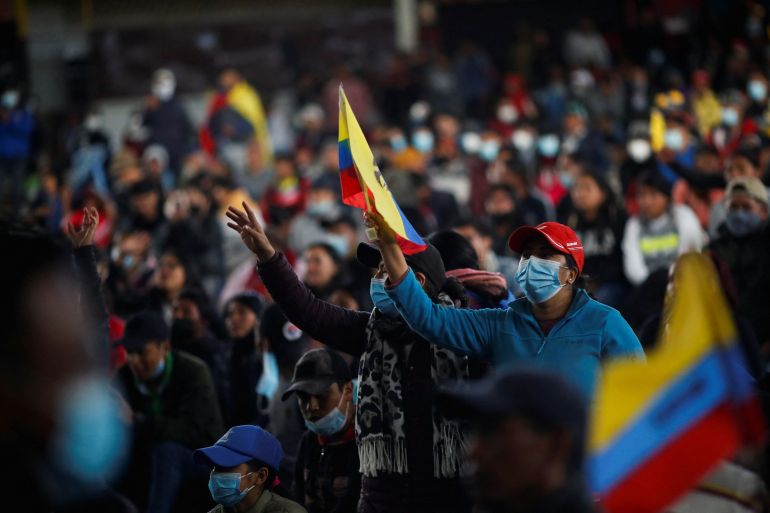Ecuador’s Lasso survives impeachment vote, halts protest talks
Lasso has said he is open to negotiations, but not with Indigenous leader Iza, whom he has accused of self-serving politics.

Ecuador’s President Guillermo Lasso has survived an attempt by opposition lawmakers to remove him, and has insisted his government will not negotiate further with an Indigenous leader to end more than two weeks of protests after a soldier was killed in an attack on a fuel convoy.
The opposition-led congress had sought to remove right-wing Lasso on Tuesday over “the serious political crisis and internal commotion” caused by the protests.
Keep reading
list of 3 itemsIndigenous protest leaders agree to talks with Ecuador government
Ecuador president announces fuel price cut amid days of protests
But the motion garnered only 80 of the 92 votes needed, according to results read aloud by the parliament’s secretary, Alvaro Salazar, in a virtual session broadcast on social media.
“In spite of the coup attempts, today the country’s institutions prevailed,” Lasso said after the vote. “It is evident who works for the political mafias. Meanwhile, we continue to work for Ecuador.”
Earlier in the day, Lasso had accused Indigenous protest leader Leonidas Iza of self-serving politics, saying: “We will not negotiate with those who hold Ecuador hostage.”
The protests, largely by members of the South American nation’s Indigenous population – which make up more than a million of its 17.7 million people – have come in reaction to rising living costs and economic hardship.
The protests were called by the powerful Confederation of Indigenous Nationalities of Ecuador (CONAIE), which is credited with unseating three presidents between 1997 and 2005. They have so far been linked to eight deaths and have led to food and medicine shortages.
The protests have also slashed the country’s oil output by more than half, according to government data, a significant blow to Ecuador as crude is its main export.
The killed soldier, identified as Jose Chimarro, died during an early-morning attack on a tanker truck escort in the country’s east.
The military said a group armed with “spears and guns” attacked the convoy, also injuring five police officers and seven soldiers.
For his part, Iza acknowledge the “brutal attack” that led to the soldier’s death, but said there was no proof protesters were responsible.
Iza has also called for the talks to continue, and said the government’s measures so far in reaction to the protests – including a gasoline price cut – have not been enough.